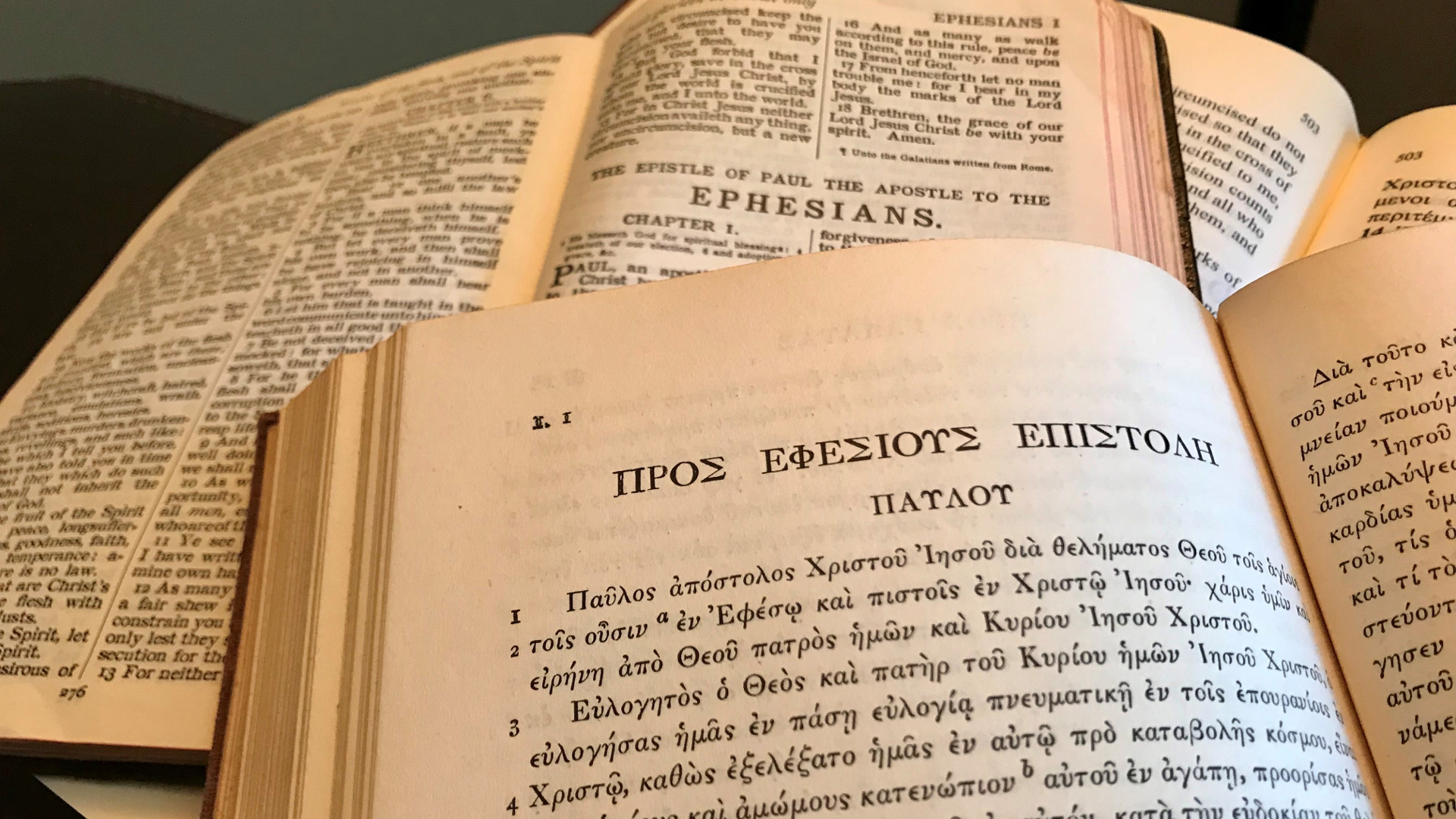
Editor’s Note: The history of missions is replete with examples of God using his Word to call his followers to engage in his redemptive work around the world by praying, giving, going, and sending. The aim of this article series (part one here) is to help Bible students, teachers, and readers recognize the theme of global missions throughout Scripture. In this installment, Dr. Benjamin Merkle, professor of New Testament and Greek at Southeastern Baptist Theological Seminary, examines three principles pertaining to global missions from Paul’s letter to the Ephesians.
 If it is true that God is on mission and that believers are called to follow in that mission, then every book of the Bible will contribute to that vision. Ephesians is certainly no exception. As Paul wrote from prison to believers in and around the city of Ephesus, he gave a number of insights into God’s global mission to redeem all peoples.
If it is true that God is on mission and that believers are called to follow in that mission, then every book of the Bible will contribute to that vision. Ephesians is certainly no exception. As Paul wrote from prison to believers in and around the city of Ephesus, he gave a number of insights into God’s global mission to redeem all peoples.
Here are three principles from Ephesians that inform our prayer, thinking, and engagement in God’s global mission.
“If it is true that God is on mission and that believers are called to follow in that mission, then every book of the Bible will contribute to that vision. Ephesians is certainly no exception.”
1. God Is Working His Plan of Redemption (1:3–14).
Paul began this letter with an extended blessing to God for his grace given to believers because of their union with Christ. Specifically, believers have been chosen (Eph. 1:3–6), redeemed (Eph. 1:7–10), given an inheritance (Eph. 1:11–12), and sealed with the Holy Spirit (Eph. 1:13–14).
Paul not only stressed that these blessings are based on our relationship with Christ (the phrases “in Christ,” “in the Messiah,” “in him,” “in the Beloved” occur in just about every verse) but also that they are given to believers as a part of God’s plan. Since the Fall, God has been on a mission to redeem a people for himself through the head-crushing seed of the woman—Jesus the Messiah (Gen. 3:15).
Ephesians 1 emphasizes this redemption mission in several ways. First, God’s sovereign work of predestination (Eph. 1:5; Eph. 1:11) and election (Eph. 1:4) is described as having been planned “before the foundation of the world” (Eph. 1:4 HCSB) Second, there is a threefold repetition of the fact that God is working out the purpose, mystery, and decision of his will (Eph. 1:5; Eph. 1:9; Eph. 1:11 HCSB). Third, Paul depicted God’s plan of redemption as not being devised and executed willy-nilly but rather “with all wisdom and understanding” (Eph. 1:8 HCSB). Finally, Paul concluded this section by stating that believers are “sealed with the promised Holy Spirit” (Eph. 1:13 HCSB) and therefore will someday possess an “inheritance” (Eph. 1:14 HCSB).
Not only has God faithfully delivered on his new covenant promise of the indwelling Spirit, but we have the assurance that we will someday possess all that God has promised us in Christ. According to Ephesians 1, God is working out his plan of redemption and, therefore, deserves to be praised.
2. God’s Plan of Redemption Includes Uniting All Peoples (Jews and Gentiles) in Christ (2:11–22).
Throughout the Old Testament, God’s plan of redemption centered on Israel, though Gentiles were often brought into the people of God. In the New Testament, we see clearly that God’s intention all along was to redeem people from “every tribe and language and people and nation” (Rev. 5:9 HCSB). Through Christ’s work on the cross, all peoples can have peace with God since the “dividing wall” has been destroyed and God has created “one new man” out of both Jews and Gentiles (Eph. 2:14–15 HCSB).
Some have suggested that Paul was thinking of the wall around the temple separating the Court of Gentiles from the inner courts and the sanctuary. The Jewish historian Josephus described this wall as being about four-and-a-half feet tall with warning signs posted all around the wall in both Latin and Greek. Two of the warning signs have been discovered and read as follows: “No foreigner is to enter within the railing and enclosure around the Temple. Whoever is caught shall have himself to blame for his consequent death.” But no longer are Gentiles excluded as strangers, being hopeless and godless. Those who once were far from God can now draw near through Christ’s blood.
Because God has destroyed the wall that divided different ethnic groups, we must be careful never to reconstruct such a wall. We don’t want to be like the man in Jesus’s parable who was graciously forgiven a massive debt by the king but then refused to forgive a fellow slave who owed him a small amount of money (Matt. 18:23–35). The way of salvation has been opened to all and we are given the task of heralding the good news of our King.
3. God’s Plan of Uniting All Peoples in Christ Will Face Opposition (6:10–18).
As children of God, we are called to imitate him (Eph. 5:1). Among other things, this means that we should be on mission to call all peoples to faith in Christ. But when we engage in this all-important activity, we will face opposition.
Even as Paul wrote to the Ephesians, he sat bound as a prisoner of Rome. In Ephesians 6, Paul reminded Christians that our battle is against Satan and his minions. Consequently, the only way to be successful in our mission is to “be strengthened by the Lord and by his vast strength” (Eph. 6:10 HCSB). This means that believers must daily put on their spiritual armor: truth, righteousness, the gospel of peace, faith, salvation, and the Word of God. The third piece of armor speaks of feet being fitted “with readiness for the gospel of peace” (Eph. 6:15 HCSB).
Isaiah 52:7 reads, “How beautiful on the mountains are the feet of the herald, who proclaims peace, who brings news of good things, who proclaims salvation” (Isaiah 52:7 HCSB). Similarly, Paul declared that Christians should be ready to proclaim the gospel. This involves the willingness of the believer to announce the good news about Jesus Christ and the peace he brings through reconciling God and man. Thus, being prepared for battle means being ready to advance the gospel and to attack Enemy territory.
Finally, prayer is how believers stand firm. It, therefore, epitomizes what it means to be strong in the Lord. Recognizing this, Paul requested prayers from his readers as he often did in his letters (see Rom. 15:30–32; 2 Cor. 1:11; Col. 4:3–4; 1 Thess. 5:25; 2 Thess. 3:1–2). He did not ask for prayer so that he would be released from prison, but so that he would faithfully and boldly convey “the mystery of the gospel” (Eph. 6:19 HCSB). The mystery is that Jews and Gentiles become the one people of God through their common faith in the Lord Jesus.
In this same way, Paul’s prayer should be our prayer—that, despite opposition, we will be on mission with God as he seeks to accomplish his plan to redeem all peoples through faith in Jesus.
Dr. Benjamin L. Merkle, a former IMB missionary, is currently a professor of New Testament and Greek at Southeastern Baptist Theological Seminary. He has authored and edited more than twenty books related primarily to church leadership, New Testament studies, and biblical Greek. He has been married for twenty-five years and has four children.

